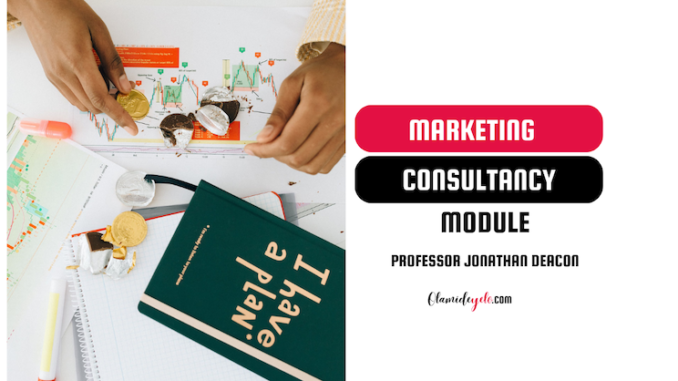
After completing the Digital Marketing Consultancy Module under the guidance of Professor Jonathan Deacon in my Master of Strategic and Digital Marketing program, I have gained practical skills and knowledge. This blog post aims to share my experiences and tools that have enhanced my capabilities as a marketing consultant and the key takeaways from the module. This is my favourite module from my master’s program This is the sixth part of my MSC Strategic and Digital Marketing Experience Series, where I share insights from my post-graduate programme at the University of South Wales . The past and subsequent parts of this series can be found . HERE Embracing the Consultancy Mindset Embracing the Consultancy Mindset
The module started by teaching the fundamental understanding of consulting as the art of solving business problems. Professor Deacon emphasized the significance of data as the foundation of consultancy, urging the exploration of various sources like staff input, industry reports, and sector analysis. This emphasis on data as the catalyst for insights resonated with me, reinforcing that as marketing consultants, we propel insight and change. The Brand Management Module: Crisis Communications Planning and Other Key Takeaways Evolution of the Consultancy Era Evolution of the Consultancy Era
Exploring consultancy eras provided historical context, from scientific management to the current insight era. The importance of consultants in fostering innovation and change was highlighted, particularly emphasizing insight as a marketing component. Understanding the six key client trends, especially the shift towards outcomes as a differentiator in the competitive landscape, broadened my perspective. Critical Stages in Consulting and Deliverables Critical Stages in Consulting and Deliverables
The module’s structured approach, from start to finish, was enlightening. Clarity on deliverables, being on time, on project, and on budget laid a foundation for successful consultancy engagements. The emphasis on the three strategic levels of consulting—people, finance, and markets—resonated with my experiences as a marketing professional. Critical Consultant Capabilities Critical Consultant Capabilities
I learned about the essential skills for a consultant during the Digital Marketing Consultancy Module: technical knowledge, engagement management, relationship skills, and business sense. These capabilities helped me evaluate my strengths, and the personal critical success factors for consultants provided a roadmap for success. A significant subject of discussion was comprehending client expectations, emphasizing nine critical components: communication, competence, credibility, trustworthiness, likeability, business acumen, responsiveness, and empathy. Building successful consulting relationships was another vital area, with trust, decorum, commonality, empathy, credibility, and value identified as the six key elements. Additionally, listening more and speaking less were emphasized to improve communication. Building Successful Consulting Relationships Building Successful Consulting Relationships
The second class emphasized the importance of building successful consulting relationships by fostering trust, decorum, commonality, empathy, credibility, and value. It also reminded me of the importance of listening more and speaking less for effective communication. My Journey Through The Personal And Professional Skills Development (PPSD) Module Crafting a Business Case and Project Management Crafting a Business Case and Project Management
The third class focused on crafting a business case and project management, with an emphasis on justifying proposed projects based on expected commercial benefits. The SOSTAC framework for strategic propositions was introduced, and the importance of planning before project initiation was reinforced. Strategic Components and the RACE Framework Strategic Components and the RACE Framework
In the final class, we explored strategic components, intervention in the change process, and the evolving landscape in the hospitality sector. The consultant’s role in diagnosing, problem-solving, and creating value for customers and organizations was reinforced. The use of various tools and questions for data analytics, such as BMC, SOSTAC, Porter’s 5 forces, and customer journey mapping, showcased the depth of analysis possible. Learning from Renowned Marketing and Business Consultants Learning from Renowned Marketing and Business Consultants
Some of the leading business and marketing consultants in the UK were invited by Professor Deacon to share their vast experience with us during the module. I had the opportunity to learn from renowned marketing and business consultants such as Luan Wise, Helen Spilsbury, Susan and Mark Wilkok, and Mike Peckham. Their sessions were inspiring and mind-blowing. Conclusion Conclusion
In conclusion, the Digital Marketing Consultancy Module has equipped me with practical tools, frameworks, and insights essential for navigating the dynamic digital marketing landscape. I am confident that I can apply these learnings to future marketing and business consulting projects. Winning the “Best Overall Presentation and Report” for my team’s consultancy pitch has given me a boost of self-confidence and positioned me as a skilled and experienced marketing consultant in the competitive UK business industry. I am excited to apply these tools, frameworks, and insights in future endeavors and continue building a successful career in marketing consultancy.

Leave a Reply